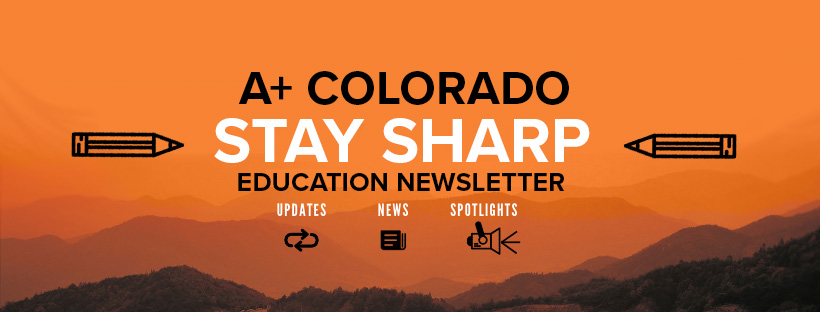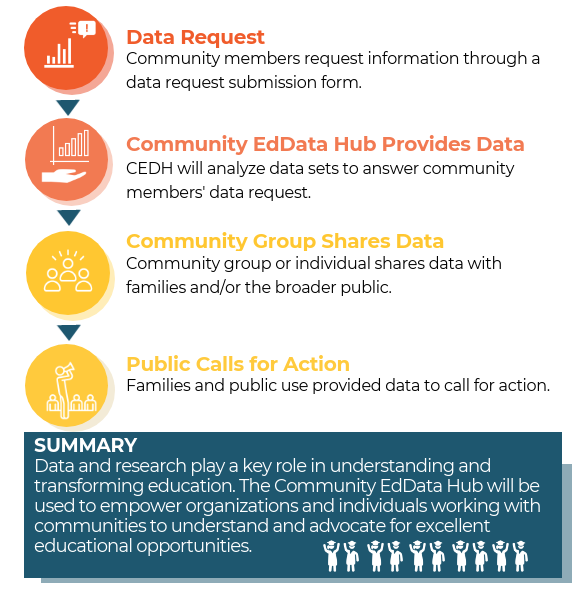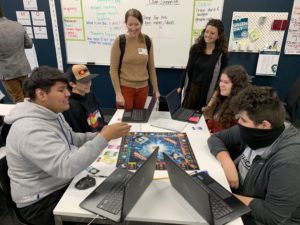Happy New Year from the A+ Colorado team. With the turn of the calendar comes the reconvening of the Colorado General Assembly and we have plenty of updates to keep you in the loop on all things #EdColo, including two moving pieces from community partners and the incredible work they are doing for Colorado’s students.
Don’t miss a sneak peek into the Annual A+ Outliers report, a state of the State for public education in Colorado.
We have also welcomed a new team member (Hey Eden)!
All of this + more in this month’s Stay Sharp newsletter.
A+ Updates
Sponsorship Opportunities and Tickets Still Available for the Best Education Party of 2020
 Tickets are going quickly to attend the best education party of the year (we’re not saying it, they are!), so act fast, tell your friends, and grab your sponsorship or tickets today.
Tickets are going quickly to attend the best education party of the year (we’re not saying it, they are!), so act fast, tell your friends, and grab your sponsorship or tickets today.
The State of the State for Colorado Education
The A+ Outliers report will be released in just a few short weeks. This report takes a look at which districts are doing the best job with their students across nearly every measured outcome (academic performance broken down by size of district, student demographics, if they qualify for free or reduced price lunch, and if they are receiving special services, graduation, + so much more). This unique report will also allow readers to dive deep into the data with our brand new visualization tool showing how Colorado districts are serving students. You don’t want to miss it.
A+ Colorado is beyond thrilled to welcome Eden onto the Policy and Research team as a Master of Public Affairs consultant supporting Community EdData Hub work.
Eden was most recently employed by Family Counseling Center, Inc., where she managed a prevention services program implementing curricula at schools in the southern seven counties of Illinois. She also worked as a classroom teacher and interned for a nonprofit in Nicaragua. Her policy interests include utilizing data-driven educational and social policies to affect change, particularly for marginalized groups. Eden earned a master’s degree in education from Southeast Missouri State University.
Get To Know Eden
The sorting hat put Eden in the Gryffindor Hogwarts House, but she can speak parseltongue.
If Eden was in the West Wing, she would be C.J. Cregg.
Eden’s advice to children is a Shel Silverstein quote: “Listen to the mustn’ts, child. Listen to the don’ts. Listen to the shouldn’ts, the impossibles, the won’ts. Listen to the never haves, then listen close to me… Anything can happen, child. Anything can be.”
Join the A+ Team
A+ is hiring an Advocacy Director. We are looking for a new teammate who is as passionate about improving public education in Colorado as we are. See the job description and submit an application by Friday, January 24th.
News to share
The Legacy of a King, and his vision for Education
Dom Barrera, the Advocacy Director of FaithBridge, reflects on Dr. Martin Luther King Jr. and his commitment to civil rights and education. Read his piece here.
Community EdData Hub 1 Year Anniversary
Happy anniversary to the Community EdData Hub, an initiative launched by A+ Colorado for organizations and individuals who want to understand the educational opportunities and outcomes for students in their communities.
Throughout the first year, A+ Colorado has partnered with several organizations and individuals, who work with communities, on various projects to help understand and advocate for excellent educational opportunities.
Who we’ve worked with:
We partnered with the African Leadership Group to release, Your Community, Your Schools, a first-ever report to serve as a guide for families whose children attend Aurora Public Schools.
In Partnership with Together Colorado, the Community Data Hub provided an analysis on Montbello schools.
We collaborated with Civic Canopy to provide information on Cañon City’s Innovative Schools.
We also worked together with FaithBridge to help answer research questions they had on how students are being served in Denver and Aurora.
The first year of the Community EdData Hub and the completion of these projects allowed us to support the mission and vision of both A+ Colorado and partner organizations.
Do you have a data question of your own? Schedule a meeting with us.
The Hubbub at the Capitol
The 2020 legislative session kicked off with pomp and circumstance, but is sure to bring substantive policy proposals. Already introduced are bills creating working groups around school safety, and educator diversity; programs and investments for mental and behavioral health in and out of school; new supports for educators including tax credits, licensure for ECE staff, and bonuses for highly effective teachers working in low-performing schools; a proposal to allow sixteen year olds to vote in local school district elections. Also top of mind for legislators working in the education policy space is expanding access to preschool, and changing the school finance formula.
Yet any discussion of new policy will have to contend with a tight budget. Full-day kindergarten will cost $204 million this year to support an additional 23,802 fully funded students relative to last year. (Stronger than expected local tax revenues mean the legislature needs to find just $9 million to fund its K-12 education obligation.) While the Interim Committee on School Finance could not agree on changes to the current practice of distributing dollars to schools, it is likely that discussions from the Committee will migrate to the Capitol, and could have a big impact on how funds are allocated to districts broadly, and/or programs specifically. Read Van Schoales’ perspective on how Colorado could spend more, and spend more wisely, to impact students.
Schools Hit The End of The Clock
Colorado’s School Accountability law created a system to identify the state’s lowest performing schools, mandating the State direct interventions in those schools after five years. More schools with chronically low academic outcomes for students are coming in front of the State Board. These are schools where students have consistently experienced the lowest outcomes relative to all other schools in the state. In November, the State Board held a hearing about Aurora Central High School. January brought Central High School in Pueblo, and HOPE Online Elementary to the State Board. Bill Metz Elementary in Monte Vista, and Abraham Lincoln High School and Manual High School in Denver are on the agenda for February.
Two thoughts. First, there is an often overlooked opportunity to bring families into these conversations well before the school enters a quasi-judicial process with the State Board of Education. House Bill 18-1355 required schools to have just one meeting with families and communities when they reached year three on the accountability clock. This is a pittance of the community engagement that should be happening to support schools, to empower families to be partners in school improvement strategies. We believe there is more room for districts and the state to engage families proactively and often around school improvement, and that family partnership should be a key piece of any strategy the State Board reviews and approves, rather than the “supplemental” information it currently provides in the accountability hearing process. (That said, it is important to share your voice through the current public comment process.)
Second, we believe the accountability clock pathways offer tools for school improvement, but are insufficient when driven by a compliance mindset to fundamentally change outcomes for students in the school. Research and experience, continue to emphasize the importance of strong school leadership, networks for learning, and educator supports and agency. There are both district and state level strategies to attract, develop and compensate teachers and leaders in schools in most need of improvement to support students. We hope the pathways and plans brought forward are not partnership in name only, and we hope both the state board and local communities hold schools and the named partners (if any) accountable for the deep work of school improvement.
Will DPS Turn Its Back on Its Own SPF?
Last week the Denver Public Schools’ Reimagine the SPF Committee voted 18-6 to recommend that DPS drop its own School Performance Framework (SPF) in lieu of the state’s SPF. Certainly the Denver SPF needs changes (as A+ and many groups have called for in the past). Yet at A+ we were surprised and disappointed to see the committee move away from making local changes, and instead opting for the state system given real differences between the state and current DPS frameworks in how they measure academic outcomes. For example, the Denver framework has a higher weighting for growth than the state framework (and conversely the state emphasizes status more than DPS does). Measures about high schools are also very different, with DPS including measures around students enrollment in advanced coursework, and whether they are on-track to graduate. There are also very different ways in which data about academic outcomes for different groups of students are incorporated. For more information about how and why these changes have come about, see Denver’s Next Journey: Communicating “Good Schools” to Families.
The committee will still decide whether to provide additional information about schools around “Whole Child” supports and outcomes, school culture, and programming, but it is unclear whether this information will be used for evaluative purposes, for information to school leaders or for broader information to community members. But this move to rely on the state’s measurement of academic outcomes means DPS will give up control over how to reflect local values or academic measures in the framework.
Amplifying Student Voice with Project VOYCE
Mariam Gopalani, a student leader at Project VOYCE, shares her work with Student Vote, a team that is working on expanding the voting age to 16 years old for school board elections.
Read her piece here.
School Spotlight: Empower Community High School
The A+ Colorado team recently had the opportunity to visit Empower Community High School in Aurora. The school opened this year with a full class of 9th graders after two years of a community design process that brought together families, students, and educators. Empower is built around student driven learning, with educators leading students through rigorous, culturally diverse academic content and students developing community based projects that allow them to engage with their community on issues they deeply care about. The model offers a student and community centered alternative to the large comprehensive high schools currently serving most Aurora students. While still in its first year of operation, students and school leaders we met with were passionate and engaged in the mission of their school and the unique path their school is trying to chart. We look forward to following their progress as they grow their community in Aurora.
A+ Answers
“The interim school finance committee discussed shifting our school funding formula, but didn’t propose changes since there isn’t new funding in the system. What do we know about how money might impact student outcomes?”
Many conversations about student success often include a discussion of funding and spending. As parents, community members, and taxpayers we often ask questions such as: How do schools spend their money? Where does this money come from? How do these contribute to students’ success? Read the full A+ Answers here.
A+ In the News
Republicans put education atop their priority list at the Capitol. We look at 8 of their ideas, The Colorado Sun
THE PODIUM | Colorado must spend more on schools — but spend it effectively, Colorado Politics
Scrapping Denver Public Schools’ ranking system could save $900,000 a year, change how parents weigh schools, Denver Post





[…] January the Reimagine SPF Committee in Denver Public Schools decided to recommend that the district use the state school performance framework to set the bar for […]